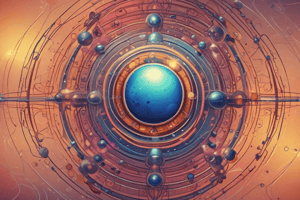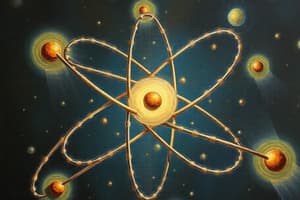Podcast
Questions and Answers
¿Cuál es la propiedad que determina el tipo de quark?
¿Cuál es la propiedad que determina el tipo de quark?
- Masa
- Sabor (correct)
- Carga de color
- Espín
¿Qué es lo que une a los quarks para formar hadrones?
¿Qué es lo que une a los quarks para formar hadrones?
- La fuerza nuclear fuerte (correct)
- La gravedad
- La fuerza débil
- La fuerza electromagnética
¿Cuál es el nombre del tipo de leptón que no participa en la fuerza nuclear fuerte?
¿Cuál es el nombre del tipo de leptón que no participa en la fuerza nuclear fuerte?
- Electrón
- Tau
- Muon
- Neutrino (correct)
¿Qué es lo que mediatiza la fuerza nuclear fuerte?
¿Qué es lo que mediatiza la fuerza nuclear fuerte?
¿Cuál es la característica que define a los quarks?
¿Cuál es la característica que define a los quarks?
¿Cuál es la propiedad que permite a los quarks unirse entre sí?
¿Cuál es la propiedad que permite a los quarks unirse entre sí?
¿Qué tipo de fuerza es la fuerza nuclear fuerte?
¿Qué tipo de fuerza es la fuerza nuclear fuerte?
¿Cuál es el número de tipos de quarks?
¿Cuál es el número de tipos de quarks?
¿Qué es lo que caracteriza a los leptones?
¿Qué es lo que caracteriza a los leptones?
¿Cuál es la función de los gluones?
¿Cuál es la función de los gluones?
Flashcards are hidden until you start studying
Study Notes
Quarks
- Definition: Quarks are elementary particles that make up protons and neutrons, which in turn form atomic nuclei.
- Types: There are six types of quarks, known as flavors:
- Up quark (u)
- Down quark (d)
- Charm quark (c)
- Strange quark (s)
- Top quark (t)
- Bottom quark (b)
- Properties:
- Quarks have a property called "color charge", which is the force that holds them together to form hadrons.
- Quarks have a property called "flavor", which determines their type.
- Quarks are never found alone in nature, but are always bound together with other quarks or antiquarks to form hadrons.
Leptons
- Definition: Leptons are elementary particles that do not participate in the strong nuclear force and are not part of the nucleus.
- Types: There are six types of leptons, known as flavors:
- Electron (e-)
- Muon (μ-)
- Tau (τ-)
- Electron neutrino (νe)
- Muon neutrino (νμ)
- Tau neutrino (ντ)
- Properties:
- Leptons have no color charge, so they do not participate in the strong nuclear force.
- Leptons have a property called "flavor", which determines their type.
- Leptons are not part of the nucleus and do not participate in the formation of hadrons.
Strong Nuclear Force
- Definition: The strong nuclear force is a fundamental force of nature that holds quarks together inside protons and neutrons, and holds these particles together inside the nucleus.
- Carriers: The strong nuclear force is mediated by particles called gluons, which are exchanged between quarks.
- Properties:
- The strong nuclear force is a short-range force, meaning it only acts over very small distances.
- The strong nuclear force is a very strong force, stronger than the electromagnetic force and the weak nuclear force.
- The strong nuclear force is responsible for holding quarks together inside hadrons, and for holding hadrons together inside the nucleus.
Quarks
- Definición: Partículas elementales que componen protones y neutrones, que a su vez forman núcleos atómicos.
- ** Tipos**: Seis tipos de quarks, conocidos como sabores:
- Quark up (u)
- Quark down (d)
- Quark charm (c)
- Quark extraño (s)
- Quark top (t)
- Quark bottom (b)
- Propiedades:
- Tienen una propiedad llamada "carga de color", que es la fuerza que los mantiene unidos para formar hadrones.
- Tienen una propiedad llamada "sabor", que determina su tipo.
- Nunca se encuentran solos en la naturaleza, sino que siempre están unidos con otros quarks o antiquarks para formar hadrones.
Leptones
- Definición: Partículas elementales que no participan en la fuerza nuclear fuerte y no forman parte del núcleo.
- Tipos: Seis tipos de leptones, conocidos como sabores:
- Electrón (e-)
- Muon (μ-)
- Tau (τ-)
- Neutrino electrón (νe)
- Neutrino muon (νμ)
- Neutrino tau (ντ)
- Propiedades:
- No tienen carga de color, por lo que no participan en la fuerza nuclear fuerte.
- Tienen una propiedad llamada "sabor", que determina su tipo.
- No forman parte del núcleo y no participan en la formación de hadrones.
Fuerza Nuclear Fuerte
- Definición: Fuerza fundamental de la naturaleza que mantiene unidos a los quarks dentro de protones y neutrones, y mantiene a estos partículas unidas dentro del núcleo.
- Portadores: La fuerza nuclear fuerte es mediada por partículas llamadas gluones, que se intercambian entre quarks.
- Propiedades:
- La fuerza nuclear fuerte es una fuerza de corto alcance, lo que significa que solo actúa sobre distancias muy pequeñas.
- La fuerza nuclear fuerte es una fuerza muy fuerte, más fuerte que la fuerza electromagnética y la fuerza nuclear débil.
- La fuerza nuclear fuerte es responsable de mantener unidos a los quarks dentro de hadrones, y de mantener unidos a los hadrones dentro del núcleo.
Studying That Suits You
Use AI to generate personalized quizzes and flashcards to suit your learning preferences.




